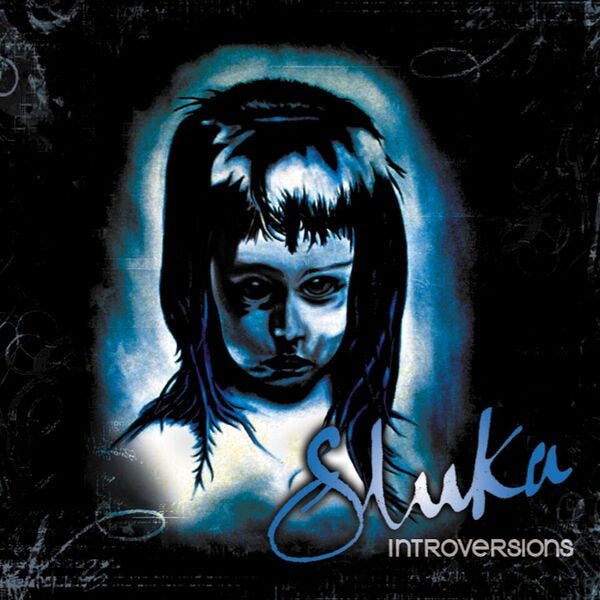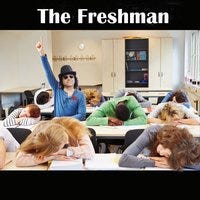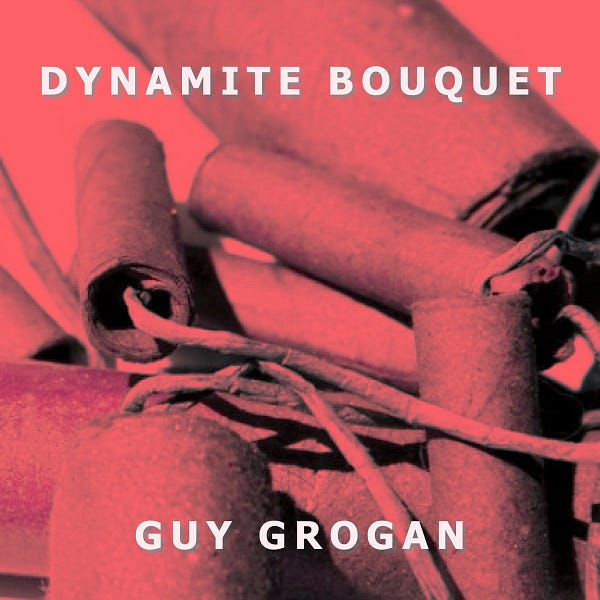 |
| INTROVERSIONS--Sluka |
Introspection, guilt, a wan hope of transcendence through the attainment of a love that cleanses the soul of all sins real and imagined, perceptions of failure that will not relent, a personal paradigm of feelings so deep that the world, indeed the universe, is coded by the severe lack of self esteem, the ever deepening chasm of depression. Those are my impression of what is generally regarded as Goth rock, the decades of stylized gloom and regret and corrosive self -regard that’s made listening to tunes by The Cure, Bauhaus, and the solo offerings of Peter Murphy work to listen to, even in my leisure time; I’m a sucker for suffering poets, outcast lovers standing upon a widow’s walk or overlooking a stormy ocean from a high, jagged cliff. Eccentrics that don’t fit in with the cookie-cutter approximations of normal behavior and attitude spoke to me for a period when I was in my own private hell as a teen who found solace in Dylan and Leonard Cohen and in the deeper metaphors of Romantic Poets for whom the insanity of being ruled by emotion was more valuable than sex or money.
Into adulthood, of course, I eventually got my terminal uniqueness and took an adult approach to matters, but not entirely. Some of me longed to immerse myself in the vats of sadness again, wallow, put on head phones and drink a rank glass of sherry, droning, guitar and synth laced songs making the cruelty of the world a personal matter. It is, in the final consideration, all about me and my feelings. Of course this is the equivalent of picking the scab and taking pleasure in the wound not healing. The seductive tones of Goth placed its tattered shawl around my shoulders more than once.
Sluka, nee Christopher Sluka, is a San Diego based singer songwriter in the Goth mold, ironic as his home base is famous for sunshine and beaches, not cliffs, dark skies or weather that reinforces dark moods. He is, though, good at the style, quite good, in fact. His latest release, Introversions shows us a man who knows the considered craft of writing solid pop tunes and who appreciates the need for variety in the flow of material. Figuring alluring riffs on keyboards and synths and supplying a variety of hooks and instrumental textures, this percolates along, each track pulling you in with a personality of its own. The lead instrument is Sluka’s remarkable voice, at first making you think of David Bowie (or Bowie’s primary influence vocally, Anthony Newley), but the resemblance fades away as this artist convincingly converts existential dread and worry into playfully , soulfully inflected readings of the surreal lyrics. Agonized crooning, Beatlesque harmonies, emphatic phrasing on the harder edged material, Introversions , as the title implies, is a series of testaments of a man investigating his emotions , with the hope that he can transcend them. This is very much about the old adage, reputedly coined by uber gloomster Nietzsche , that if you stare into the abyss, the abyss will wind up staring at you. The hitch, however, is that Sluka prefers a little flavor to his plate, a little color to shine in to the dank vault of a world view. He remembers to rock, to croon, to laugh (if slightly) to lift his voice on high (if briefly) before it it drags along the lower registers again, grainy and unloved.
The stylistic range is impressive, with album opener “Valentine Lies”, guided by pensive piano configurations and melodramatic beats, climbs from the ground up, with Sluka’s voice capturing the mood of a man giving himself over to the sweep of love. “San Diego Zoo” takes a lighter, airier approach, strummed guitar and tasty, short guitar riffs, sweets bits of whimsy and regret, a man looking to move out of the dark house and into the sunshine of the spirit. Sluka’s voice’s, at once nasal, husky, and amazingly lithe, phrases the contradictions concisely. The final track, “Gothic Cavalier”, is the strongest song, a bit of menace provided by chunky guitar chords, a persistent bass and synth textures that overlay an enterprisingly off-kilter melody, the song swells at the chorus as Sluka relates the first person tale of a man seemingly encased in a gloom he cannot shake, an observer, a man of part unable to make lasting connections with the normal life.
This is, in a word, catchy as anything you’re likely to come across among recent releases. Sluka’s preferred mood, of course, is downcast, the fatalistic pessimism and anesthetized moodiness that are the creative grounds for poets and assorted fans afflicted with swampy temperaments, but what gets me to play Introversions again and again in one day are his hooks, his riffs, his melodies, his skill at varying his moods and styles and thereby modulating his songs through a richer than usual selection of emotions. His music is catchier, his manner is more questing, searching, a man in a dark room braving a bit of sunshine, a little bit of joy.















